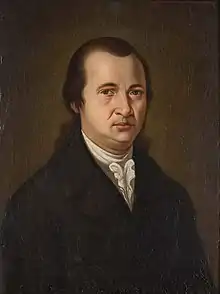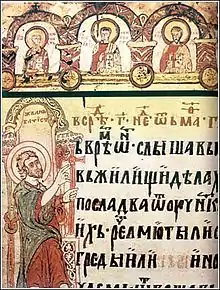Dositej Obradović
Dositej Obradović (Serbian Cyrillic: Доситеј Обрадовић; Čakovo, Habsburg Monarchy, 17 February 1739 – Belgrade, Serbia, 7 April 1811) was a Serbian writer, biographer, diarist, philosopher, pedagogue, educational reformer, linguist, polyglot and the first minister of education of Serbia.[1] An influential protagonist of the Serbian national and cultural renaissance, he advocated Enlightenment and rationalist ideas, while remaining a Serbian patriot and an adherent of the Serbian Orthodox Church.
Dositej Obradović Доситеј Обрадовић | |
|---|---|
 | |
| Minister of Education of Serbia | |
| In office 1807–1811 | |
| Prime Minister | Mateja Nenadović |
| Preceded by | Post established |
| Succeeded by | Ivan Jugović |
| Personal details | |
| Born | Dimitrije Obradović 17 February 1739 Tschakowa, Kingdom of Hungary, Habsburg monarchy (now Ciacova, Romania) |
| Died | 7 April 1811 (aged 72) Belgrade, Rumelia Eyalet, Ottoman Empire (now Belgrade, Serbia) |
| Nationality | Serbian |
| Signature | |
Both Dositej Obradović and Teodor Janković-Mirijevski viewed teaching as a subject most worthy of study and they are therefore known, each in his own right, as the fathers of pedagogy in Serbia, Austria and Russia. In fact, they were instrumental in making education a separate branch of knowledge, particularly with the advent of the first teachers' colleges in the 18th century.
Life

Dositej Obradović was born Dimitrije Obradović at the village of Čakovo (now Ciacova, Timiş County, Romania) in Banat, probably in 1739. From an early age, he was possessed with a passion for study. Obradović grew up bilingual (in Serbian and Romanian) and learned classical Greek, Latin, modern Greek, German, English, French, Russian, Albanian and Italian.[2]
On 17 February 1757 he became a monk in the Serb Orthodox monastery of Hopovo, in the Srem region, and acquired the name Dositej (Dositheus). He translated into Serbian many European classics, including Aesop's Fables.
Having devoured the contents of the monastery library, he hungered for further learning. On 2 November 1760 he left the monastery of Hopovo, bound for Hilandar, Mount Athos.
For forty years, he traveled Europe and Asia Minor: Albania, Dalmatia, Corfu, Greece, Hungary, Turkey, Germany, Romania, France, Russia, England, Italy, Poland. Finally he went to Belgrade, at the invitation of Karađorđe Petrović, to become, in the newly organized government, Serbia's first minister of education. Wherever he went during the early years, he attended lectures at the best schools in these locations. At University of Halle, he was a student of Johann Eberhard who himself was a disciple of Christian Wolf.
From Dositej’s recollections of his early years spent in the monastery we also learn about the enlightened bishop of Temišvar, Georgije Popović, and amongst his castigation of monastics we find words of praise for Dositej’s rationalist hegumen at Hopovo monastery. Other less known Enlightenment figures among the Serbs who were Dositej’s precursors such as Dionisije Novaković, Visarion Pavlović, Dimitrie Eustatievici, Simeon Končarević, Vasilije Jovanović-Brkić or contemporaries, such as Zaharije Orfelin, Jovan Rajić, Simeon Piščević, Teodor Janković-Mirijevski all evolved from scholastic, ecclesiastical or military milieus.
Obradović wrote first individual biographies and quickly the genre expanded to the form of biographical collection modelled on examples of Nepos, Suetonius, Plutarch, or Diogenes Laertius.
Obradović helped introduce to the Serbs the literature of certain western European countries.[3] He and Vuk Karadžić, whom Obradović influenced,[4] are recognized as the fathers of modern Serbian literature. Because the Serbian populace often suffered famine, Obradović also introduced potato cultivation to Serbia.
Works
- Slovo poučiteljno Gosp. Georg. Joakima Colikofera, Leipzig, 1774, 31 pp.
- Pismo Haralampiju, 1783.
- Život i priključenija D.O., Leipzig, 1783.
- Sovjeti zdravago razuma, Leipzig, 1784, 119 pp.
- Ezopove i pročih raznih basnotvorcev basne, Leipzig, 1788, 451 pp.
- Pesme o izbavleniju Serbije, Vienna, 1789, 4 pp.
- Sobranije raznih naravoučitelnih veščej, Pécs, 1793, 2 + 316 pp.
- Etika ili filozofija naravnoučitelna, Venice, 1803, 160 pp.
- Vostani Serbije, 1804.
- Mezimac, Budim 1818, 230 + 11 pp.
- Ižica, 1830
- Pisma, Budapest, 1829, 126 pp.
- Prvenac, Karlštat 1930, 17 + 168 pp.
- Jastuk roda moga (lost), 1813
Translations
- Slovo poučitelno, 1784.
- Istina i prelest, (short story), 1788.
- Put u jedan dan, (short story), 1788.
- Aesop's Fables
- Hristoitija
- Bukvica
- Etika
- Venac
- Damon
- Ingleska izrečenija
In popular culture
- Pillow of my grave, a television miniseries based on the biography of Dositej Obradović and directed by Sava Mrmak, was produced in 1990 by the Serbian broadcasting service RTS.[5][6][7]
References
- Biography (Serbian)
- The south Slav Journal / "Dositey Obradovich Circle". - London : South Slav Research & Study Centre 1.1978 - 5. ISSN 0141-6146
- Wladimir Fischer: The Role of Dositej Obradovic in the Construction of Serbian Identities During the 19th Century. In: spacesofidentity vol. 1.3 (2001)
- https://www.google.ca/books/edition/History_of_the_Balkans_Volume_1/qR4EeOrTm-0C?hl=en&gbpv=1&dq=dositej+obradovic+influences+vuk+karadzic&pg=PA177&printsec=frontcover
- Pillow of my grave on IMDB
- Pillow of my grave on YouTube TV miniseries, 1 part
- Pillow of my grave on YouTube TV miniseries, 2 part
- Jovan Skerlić: Istorija nove srpske književnosti, Belgrade, 1914, pages 58–62[1]
- Translated and adapted from Serbian Wikipedia: https://sr.wikipedia.org/sr-ec/%D0%94%D0%BE%D1%81%D0%B8%D1%82%D0%B5%D1%98_%D0%9E%D0%B1%D1%80%D0%B0%D0%B4%D0%BE%D0%B2%D0%B8%D1%9B?msclkid=e1678203c50411ec8b9acd04cbedfcb9
Further reading
| Wikimedia Commons has media related to Dositej Obradović. |
- Cassell's Encyclopaedia of World Literature, Volume 2, Funk & Wagnalls, 1954.
- Chambers Biographical Dictionary, Chambers Harrap, 1997.
- Ćurčić, N. M. J. The Ethics of Reason in the Philosophical System of Dositej Obradovic A Study of His Contribution in This Field to the Age of Reason. London: Unwin Bros. Ltd, 1976.
- Fischer, Wladimir, "The Role of Dositej Obradovic in the Construction of Serbian Identities During the 19th Century," Spaces of Identity (1.3, 2001), 67–87.
- Fischer, Wladimir: Creating a National Hero: The Changing Symbolics of Dositej Obradović. In: Identität – Kultur – Raum. Turia + Kant, Wien 2001, ISBN 3-85132-301-7.
- Fischer, Wladimir, "Dositej Obradović and the Ambivalence of Enlightenment". Heppner/Posch (eds.), Encounters in Europe's Southeast, Bochum: Winkler, 2012, ISBN 978-3-89911-190-3, ISBN 978-3-89911-205-4.
- Javarek, Vera (April 1947). "Dositej Obradović and the English rationalists". The Slavonic and East European Review. 25 (65).
- Merriam-Webster's Biographical Dictionary, Merriam-Webster, 1995.
- Obradović, Dositej. The Life and Adventures of Dimitrije Obradović. University of California Publications in Modern Philology 39. Berkeley; Los Angeles, 1953.
- Pijanović, Petar: Život i delo Dositeja Obradovića. Zavod za udžbenike i nastavna sredstva, Beograd 2000.
- "South Slavic Writers Before World War II". Dictionary of Literary Biography, Volume 147, Gale Research, 1995.
- Skerlić, Jovan, Istorija Nove Srpske Književnosti (Belgrade, 1914, 1921).
